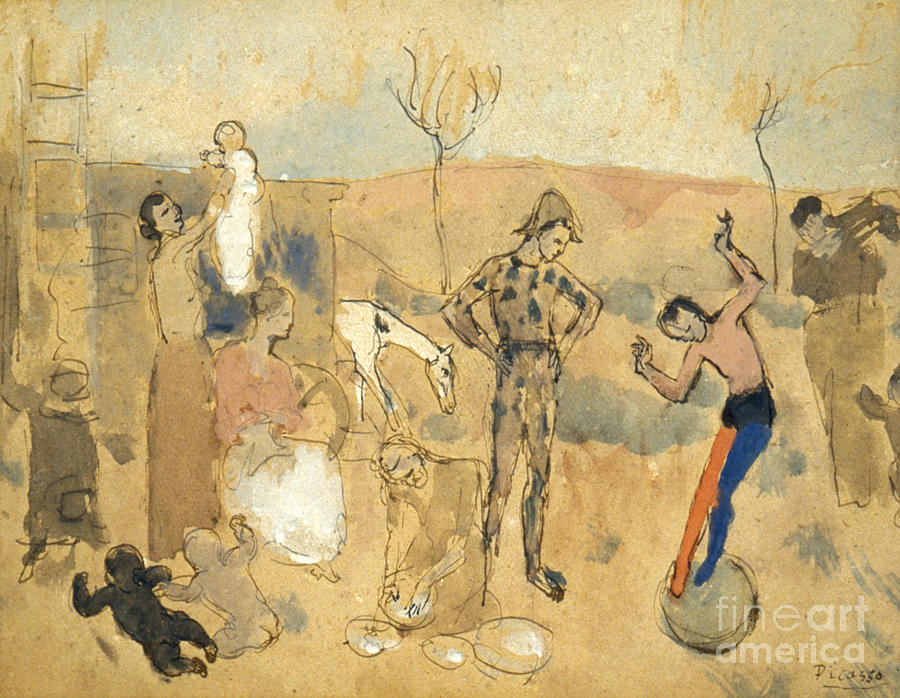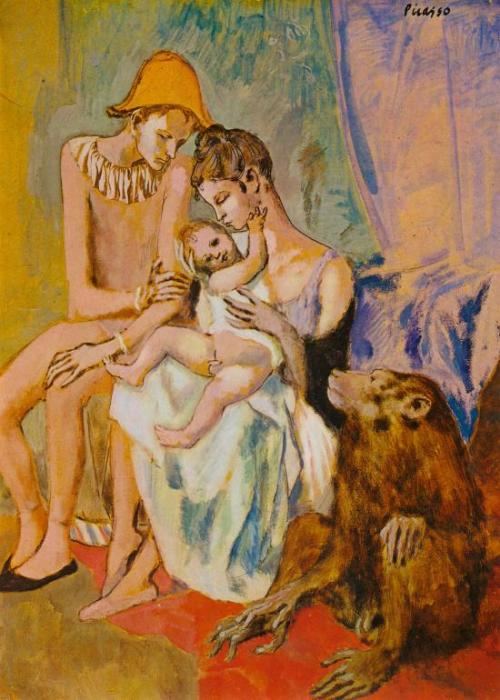In this article I will take a deeper look at - The One Who Faces the Other Way - (Described in our manifesto.)
Sociality
 |
| Picasso: Circus Family, 1905. |
Our biology guides us with pleasure. Sex feels real good because it is so important. Making the important things pleasurable and enjoyable so you will want to do it is nature's guide. It is where we learn whats important. Human rights are based on human need. The rewarding feelings we have when we share each other's company is your body telling you it's good for you, and therefor an important subject for attention.
Attention
An important part of what makes us human and what helped forge our social bonds is our ability to direct attention. Sharing attention by giving and taking mental focus is key to the social process. We crave getting and giving attention. It is as important as oxygen and nutrition for us. In this process we humans far surpass any other animal in our desire and ability to maintain focused attention for very long periods of time. By sharing attention we transmit meaning, tell story, laugh, and fall in love, all our most human aspects.
When we share attention we face each other. We direct our gaze towards those we engage with.
Face to face. One sharing thoughts, ideas and emotions with the other. From each other's faces we can easily read and unconsciously interpret so much subtle information.
 |
| Harlequin’s Family With an Ape (1905) |
We are the species with the most complex and advanced sociality. Other species like bees, ants, sheep, chimpanzees and praerie dogs all show different aspects of social behavior, but none are as varied and, most importantly, as adaptable as us. Some biologists calls us an "ultrasocial species".
Primatologist Michael Chance recognized that subordinates pay disproportionate attention to dominants, glancing at them far more than the dominants at the subordinates, and proposed that the social organization of attention has been a crucial factor in human evolution. He observed that hierarchy establishes itself rapidly among children, whose status can be ranked accurately according to the frequency with which they are looked at by three other children simultaneously.
A chimpanzee uncertain that it can gain rank through force or threat can often improve its status by other attention-getting devices - doing tricks and 'showing off.' Children do the same thing, often accompanied by cries of 'look at me.' But children also soon learn about others' emotional resistance to the undeserved usurpation of attention, and our consequent dislike of showoffs or bores.
From Brian Boyd's excellent book Origin of Stories.
Within the preceding paragraphs I believe we see the very process that drove the development of our Craft. People want attention, but people only willingly give it if you deserve to get it and keep it. Our ancestors would learn how to get attention but also needed to learn and develop how to be worthy of keeping it. They explored human nature and psychology as they investigated what was worthy of attention and how to present those things in the most interesting way.
Showman
From the word Showman we get all the information we need in regards to who he is and what his role and purpose is.
First I would like to propose that the term 'man' in Showman is to be understood as the 'man' in human. Not a gender specific ending. With this the term changes meaning from one man to Mankind. It describes a particular kind of person, not in terms of sex but of vocation.
The vocation or calling of the Showman is to show things to others in an interesting and joyful way. Like musicians shape and refine sounds, we have refined the process of 'sharing by showing'.
For me the best way to describe what our fundamental role is: "One Who Faces The Other Way."
A Showman is One Who Faces the Other Way.
One that has walked with the crowd
then turned around to face the others.
He cries for attention
and has something to Show
when he gets it.
(an Illuminated Showman's Manifesto)
One who get other's attention and knows how to make it worthwhile. One who has understood the power which lies in this and the importance of the Material being worth sharing.
A good Showman will pay attention to his Crowd's reaction and shape his presentation to suit them. Tuning and teasing a biological system of reward meant to guide us to what's important for our existence and well being.
One interpretation of the term would be: one which is pleasurable or interesting to watch. This seems simple but because of its primacy the feeling of shared attention is very fundamental and deeply rewarding. By getting and holding attention and skillfully directing it, the Showman engages and gives his Crowd a good time. This is a very meaningful and joyful social interaction. Something which strengthens the Showman's position in the group.
When one person faces the others to tell a thrilling tale of today's hunt, and tells it in a way that transports the Crowd right into in the midst of hooves kicking and blood running, a Crowd experiences great pleasure.
Our Tradition
We modern Showmen are the latest in a tradition of shapers of the special relationship that exists between people, ie sociability. This trait might well have been the fundamental characteristic setting us on our path to become human. The Shamen and story tellers of the cavemen and early hunter gatherer tribes all grasped and practiced the things we do. Their repertoire, routines and material were different, but the tool of showmanship, our illustrious Craft, was the same.
| From tomb 15 in Beni Hassan, - 4000 years old. |
 Whenever someone belittles your Craft as 'just
entertainment,' maybe as opposed to art, know that your vocation has a
deeper and richer history than the written plays and theatrical
productions of the rich and powerful. We Showmen were engaging, educating and healing Crowds tens of
thousands of years before the invention of writing. The Art they speak
of is a Johnny-come-lately to the unique powers of Those Who Faces
The Other Way. Their Art is but a particular aspect of our Craft.
Whenever someone belittles your Craft as 'just
entertainment,' maybe as opposed to art, know that your vocation has a
deeper and richer history than the written plays and theatrical
productions of the rich and powerful. We Showmen were engaging, educating and healing Crowds tens of
thousands of years before the invention of writing. The Art they speak
of is a Johnny-come-lately to the unique powers of Those Who Faces
The Other Way. Their Art is but a particular aspect of our Craft. Whilst the rich and intelligent gathered in theaters and operas, our kind were on every street corner and wherever people gathered. We are from the people, for the people.
What we do, in circuses, pubs and cabarets, we do because people like it. Like how the sexual preference of the pea hen shaped and created the peacock's formidable and encumbering tail, Crowds have shaped the Showman's material. What we find in carnivals is the sum of what thrills, pleases, and fascinates humankind.
The Crowd and their attention is what gives purpose to the showman's vocation. He is a bringer of joy and insight to others. This is his responsibility, to leave the Crowd Illuminated through sheer joy, arousal or through intellect. The Showman enjoys getting the attention and because of his skill in holding and shaping it the Crowds loves giving it. It is a win win situation.

No comments:
Post a Comment